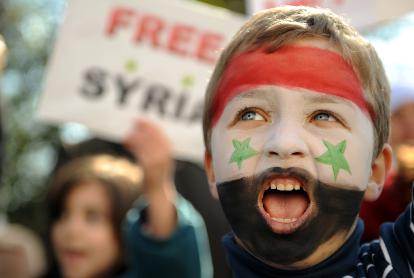UPDATES
Déjà vu in Hama and Across Syria
July 6, 2011 | Geoffrey Levin

In February 1982, over 29 years ago, Syria’s President Hafez Assad sent his younger brother to ‘deal with’ an uprising in a Sunni-majority city called Hama. Between 10,000 and 30,000 civilians died, killed for attempting to topple the Alawite dictator that reigned for over a decade.
Today history appears to be repeating itself, in the same city but with a different Assad. Reports today that 16 civilians in Hama were killed by President Bashar Assad’s forces can be added to the already 1,300 dead since the current Syrian uprising began in March, 130 in Hama alone. These numbers are much smaller than the estimates from 1982, which numbered in the tens of thousands. Today, rather than President Hafez Assad, it is his son Bashar who presides over the current massacre in Hama, where his current victims are quite literally the children of those killed by Hafez.
The recent reports from Hama come amid similar reports from all over Syria. Today’s uprising in Hama is not isolated as was the one in 1982. The government is violently responding to protests in all corners of the country. A recent 23-page report from Amnesty International has documented widespread massacres and human rights abuses all across Syria:
Amnesty International considers that the Syrian army and security forces committed…crimes against humanity. These crimes include murder, torture, arbitrary detention and other severe deprivation of liberty, and other inhumane acts committed intentionally to cause great suffering or serious damage to mental or physical health. If such crimes, as well as physical violence and destruction of personal property, were committed by reason of Tell Kalakh residents’ political opposition to the regime, they would also amount to persecution as a crime against humanity.
In terms of individual instances, the report cites plenty:
“On at least two occasions, Amnesty International was told that Syrian forces fired at fleeing families, injuring people.”
“Soldiers counted those arrested by stabbing a lit cigarette on the back of the detainees’ necks. An Amnesty International delegate saw the burn mark on the neck of a 20‐year‐old man who had fled to northern Lebanon after his release.”
“A group of soldiers ordered detainees to say that Bashar was their God. Blindfolded and with their hands tied, the detainees remained silent, he said, whereupon they were pounded by what seemed to be a metal rod, causing some of them to lose consciousness.”
In addition, the report cites horrific personal testimonies from many of the regime’s victims, including some who were already injured:
“The interrogator asked me if I was married. I said I wasn’t, so he said he was going to cut off my male organ. He beat me hard on my body until I fainted. I regained consciousness after water was splashed water onto me, and without warning he applied an electric shock.”
“As I was carried inside al‐Bassel Hospital, male and female nurses wearing green or white uniforms swore at me and hit me. I remember one woman wearing a white uniform took off her shoe and hit me so hard with it on my head that I started bleeding…someone poured a bottle of surgical spirit all over my face. I started coughing hard so a nurse wearing a green uniform admonished me, saying: ‘You pig, you’re pretending that you’re unconscious’…Someone stitched my wounds without giving me any anesthesia. I gasped in pain and I was shivering…[The guards] took me to someone who ordered me to lie down on the floor on my stomach and put my feet up, and he beat me hard with a stick on the soles of my feet. He also kicked my body and accused me of being a saboteur.”
Besides condemning the military, the report criticized the president himself.
President Bashar Assad has so far given no indication in his public speeches that the authorities are investigating crimes and other human rights abuses or intending to hold accountable members of the army and security forces who are allegedly responsible for them.
Like his father, Bashar Assad holds ultimate responsibility for the atrocities that are currently being perpetrated in Syria. Hopefully, unlike his father, Bashar’s rule will end as a result of the uprising. Yet continued violence on the part of the government makes a peaceful resolution even less likely, as Assad chooses to cling to power rather than yield to the demands of the Syrian people.
Tags: Middle East





